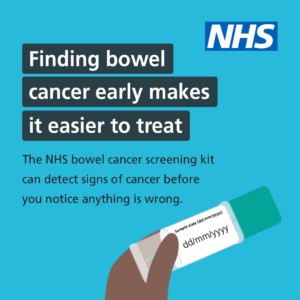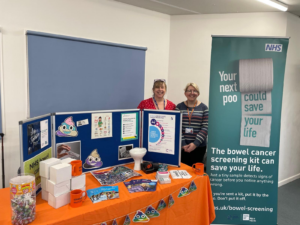 A hospital screening service is appealing to people in East Yorkshire and Northern Lincolnshire to overcome their embarrassment so they can be checked for bowel cancer.
A hospital screening service is appealing to people in East Yorkshire and Northern Lincolnshire to overcome their embarrassment so they can be checked for bowel cancer.
Everyone aged 50 to 74 is eligible for bowel screening every two years.
However, although bowel cancer is one of the most common cancers in the UK, figure show only 69 per cent of people send back their tests, meaning those with cancer are missing out on early treatment which could save their lives.
With Tuesday, April 1, marking the start of Bowel Cancer Awareness Month, Paula Brown, Programme Manager for Humber and Yorkshire Coast Bowel Cancer Screening Centre, urged people to do their tests at home.
She said: “We understand people feel embarrassed to talk about poo or think about toilet matters but we would urge you to overcome this and do this painless and easy test.
“You can do it in the privacy of your own toilet – no one is watching or judging you – and taking a few minutes to complete the test can give you peace of mind – or allow us to help you if you need further tests.”
 The faecal immunochemical test (FIT) examines a sample of your poo for blood, one of the signs of bowel cancer. Here’s an easy, step-by-step guide from the NHS, showing you how to complete the test at home.
The faecal immunochemical test (FIT) examines a sample of your poo for blood, one of the signs of bowel cancer. Here’s an easy, step-by-step guide from the NHS, showing you how to complete the test at home.
Humber and Yorkshire Coast Bowel Cancer Screening Centre supports people in Hull, East Yorkshire, Northern Lincolnshire and North-East Lincolnshire who require further screening for bowel cancer following the results of their initial home FIT test.
Based at Castle Hill Hospital in Cottingham and Diana, Princess of Wales Hospital in Grimsby, the team of specialist nurses known as Specialist Screening Practitioners (SSPs), doctors and admin staff help people whose home tests show abnormal levels of blood in their poo..
You’ll have a chat with one of the specialist nurses who’ll discuss your results and explain the medical procedure known as a colonoscopy where a thin, flexible tube with a camera checks for abnormalities such as polyps, inflammation or cancer.
Paula said the highly skilled hospital-based team will be able to allay any concerns or fears you may have if you’re called for further tests.
She said: ““Of those who did the test in 2021/22, just under two per cent required further testing so the chances are high that you will not need to do anything until you get your next FIT test in another two years.
“But it’s important that you do the home test in the first place, confident in the knowledge that our team will be here to help and support you if you require further examination.”

